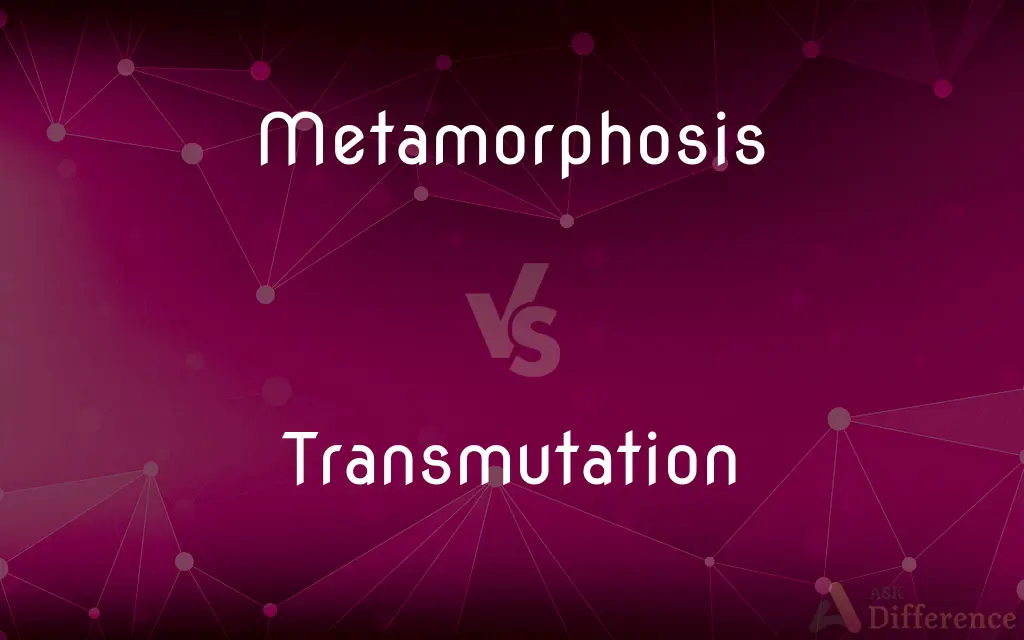Metamorphosis vs. Transmutation — What's the Difference?
Edited by Tayyaba Rehman — By Maham Liaqat — Updated on March 29, 2024
Metamorphosis refers to a biological process of development, while transmutation involves changing one element or form into another.

Difference Between Metamorphosis and Transmutation
Table of Contents
ADVERTISEMENT
Key Differences
Metamorphosis is a biological phenomenon that involves a significant change in the form or structure of an organism as it grows, typically from an immature form to a mature form. This process is commonly observed in insects, such as butterflies and beetles, where it includes stages like larva, pupa, and adult. Transmutation, on the other hand, historically refers to the alchemical process of changing base metals into noble metals like gold. In modern contexts, it often relates to the change of one chemical element into another, such as in nuclear physics, where it involves changing the number of protons in an atom's nucleus, effectively transforming it into a different element.
While metamorphosis is a natural, biological process that occurs over various stages of an organism's life cycle, transmutation typically involves an instantaneous or rapid change, often induced by external processes or forces. Metamorphosis is essential for the survival and reproductive success of many species, facilitating adaptations to environments and life cycle strategies. Transmutation, particularly in the nuclear context, has implications for energy production, medical treatments, and waste management, among other applications.
Metamorphosis impacts individual organisms, allowing them to undergo profound transformations that affect their morphology, behavior, and sometimes habitat. Transmutation, especially in nuclear reactions, involves altering the fundamental identity of atoms, with significant applications in science and technology. Both processes entail change, but they operate in vastly different contexts and scales—from the life processes of organisms to the atomic transformations in the nucleus.
Understanding the differences between metamorphosis and transmutation underscores the diversity of transformation processes in nature and technology. Metamorphosis illustrates the complexity of life and evolutionary adaptations, while transmutation highlights human capabilities to alter matter at its most fundamental levels, opening up possibilities for advancements in various fields.
Comparison Chart
Definition
Biological process of development from immature to mature form.
Changing one element or form into another, often in a non-biological context.
ADVERTISEMENT
Context
Observed in living organisms, especially insects and amphibians.
Seen in alchemy and nuclear physics.
Process
Involves stages like larva, pupa, and adult.
Involves altering atomic structure, such as changing proton numbers.
Purpose
Facilitates survival by reducing competition and enabling adaptation.
Used in creating new elements, energy production, and waste management.
Examples
Butterfly development from caterpillar to adult.
Conversion of uranium into plutonium in a nuclear reactor.
Compare with Definitions
Metamorphosis
The transformation from an immature form to an adult form in two or more distinct stages.
The caterpillar's metamorphosis into a butterfly is a remarkable process of nature.
Transmutation
Demonstrates the ability to alter matter at its most fundamental level.
Transmutation reveals the intricate interplay of forces within an atom, offering insights into the building blocks of matter.
Metamorphosis
A process that allows organisms to exploit different habitats or resources as they grow.
Frog metamorphosis allows for aquatic larvae and terrestrial adults, reducing intraspecies competition.
Transmutation
Can be naturally occurring or artificially induced.
The natural transmutation of radioactive isotopes contributes to the heat of the Earth's core.
Metamorphosis
Characterized by significant physiological and structural changes.
During metamorphosis, a tadpole develops legs and loses its tail as it transitions into a frog.
Transmutation
The conversion of one chemical element into another, a concept originating from alchemy.
Alchemists sought the secret of transmutation to turn lead into gold.
Metamorphosis
Essential for the lifecycle and reproduction of many species.
The metamorphosis of mosquitoes is crucial for their spread and survival.
Transmutation
Has practical applications in energy production, medicine, and waste management.
Transmutation processes are key to developing nuclear energy and treating certain types of cancer.
Metamorphosis
Reflects the complexity and adaptability of biological organisms.
Metamorphosis showcases the evolutionary adaptations that enable species to thrive in diverse environments.
Transmutation
In nuclear physics, involves changing the number of protons in an atom's nucleus.
Nuclear transmutation can occur during radioactive decay or in nuclear reactors.
Metamorphosis
Metamorphosis is a biological process by which an animal physically develops after birth or hatching, involving a conspicuous and relatively abrupt change in the animal's body structure through cell growth and differentiation. Some insects, fish, amphibians, mollusks, crustaceans, cnidarians, echinoderms, and tunicates undergo metamorphosis, which is often accompanied by a change of nutrition source or behavior.
Transmutation
The action of changing or the state of being changed into another form
Grotesque transmutations
The transmutation of the political economy of the post-war years was complete
Metamorphosis
A transformation, as by magic or sorcery.
Transmutation
The act or an instance of transmuting; transformation.
Metamorphosis
A marked change in appearance, character, condition, or function.
Transmutation
The state of being transmuted.
Metamorphosis
A usually degenerative change in the structure of a particular body tissue.
Transmutation
(Physics) Transformation of one element into another by one or a series of nuclear reactions.
Metamorphosis
A transformation, such as one performed by magic.
Transmutation
The supposed conversion of base metals into gold or silver in alchemy.
Metamorphosis
A noticeable change in character, appearance, function or condition.
Transmutation
(obsolete) Change, alteration.
Metamorphosis
(biology) A change in the form and often habits of an animal after the embryonic stage during normal development. (e.g. the transformation of a caterpillar into a butterfly or a tadpole into a frog.)
Transmutation
The conversion of one thing into something else; transformation.
Metamorphosis
(pathology) A change in the structure of a specific body tissue. Usually degenerative.
Transmutation
(alchemy) Specifically, the supposed transformation of one element into another, especially of a base metal into gold.
Metamorphosis
Change of form, or structure; transformation.
Transmutation
(physics) The actual transformation of one element into another by a nuclear reaction.
Metamorphosis
The change of material of one kind into another through the agency of the living organism; metabolism.
Transmutation
The act of transmuting, or the state of being transmuted; as, the transmutation of metals.
Metamorphosis
A striking change in appearance or character or circumstances;
The metamorphosis of the old house into something new and exciting
Transmutation
The change or reduction of one figure or body into another of the same area or solidity, but of a different form, as of a triangle into a square.
Transmutation
The change of one species into another, which is assumed to take place in any development theory of life; transformism.
Transmutation
An act that changes the form or character or substance of something
Transmutation
A qualitative change
Transmutation
(physics) the change of one chemical element into another (as by nuclear decay or radioactive bombardment);
The transmutation of base metals into gold proved to be impossible
Common Curiosities
What is metamorphosis?
Metamorphosis is a biological process where an organism undergoes significant physical changes after birth or hatching, typically involving distinct life stages.
How has the concept of transmutation evolved over time?
Transmutation's concept has evolved from alchemical attempts to convert base metals into gold to modern nuclear physics' ability to transform elements at the atomic level.
Is metamorphosis unique to insects?
While commonly associated with insects, metamorphosis also occurs in other animal groups, such as amphibians and certain types of fish.
What is transmutation?
Transmutation refers to the change of one chemical element into another, either through natural processes like radioactive decay or through artificial means in nuclear reactors.
How does metamorphosis differ from simple growth?
Unlike simple growth, metamorphosis involves profound and distinct stages of development, often accompanied by a change in habitat or behavior.
What are the applications of transmutation?
Transmutation has applications in nuclear energy production, medical isotope creation for treatments, and the management of nuclear waste.
Can transmutation occur naturally?
Yes, natural transmutation occurs in processes like radioactive decay, where unstable isotopes spontaneously transform into stable ones.
What role does metamorphosis play in evolution?
Metamorphosis allows species to adapt to diverse environments and life strategies, contributing to evolutionary success and biodiversity.
What challenges do organisms face during metamorphosis?
Organisms may be vulnerable during certain stages of metamorphosis, requiring adaptations like protective cocoons or rapid development to mitigate risks.
Why is metamorphosis important for some species?
It allows species to exploit different ecological niches throughout their life cycle, reducing competition for resources and increasing survival rates.
Share Your Discovery

Previous Comparison
Abeyance vs. Stay
Next Comparison
Process vs. CriteriaAuthor Spotlight
Written by
Maham LiaqatEdited by
Tayyaba RehmanTayyaba Rehman is a distinguished writer, currently serving as a primary contributor to askdifference.com. As a researcher in semantics and etymology, Tayyaba's passion for the complexity of languages and their distinctions has found a perfect home on the platform. Tayyaba delves into the intricacies of language, distinguishing between commonly confused words and phrases, thereby providing clarity for readers worldwide.














































